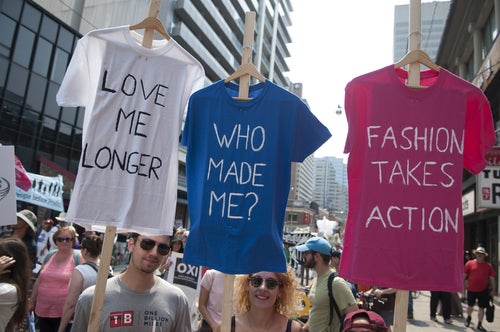Although the fashion and textile industry is one of the most polluting on the planet, second only to oil and gas, consumers remain largely unaware of its real impact on our environment.
The fashion industry is in fact the second largest cause of industrial water pollution in the world – and is responsible for 10% of global carbon emissions, more than international flights and shipping combined.
In the UK alone, consumers continue to buy an average of 26kg of clothing every year. But while the impact producing these clothes is having on our planet is a real problem, fashion brands continue to ignore the root cause of the ever-growing environmental issue they are causing.
Now is the time for action, and for industry leaders and fashion brands to lead by example.
One of the most damaging elements of the garment manufacturing process is the dyeing of fabrics, and addition of properties such as wicking and waterproofing, which are still done by decades-old – and highly polluting – traditional methods.
To put the scale of the issue into perspective, the total amount of clothes we buy globally creates 553 billion tonnes of CO2 and 8.3 trillion tonnes of dye-polluted wastewater each year – from the dyeing process alone.
And if fashion brands don’t act now to change the way their clothes are dyed, the CO2 emissions generated by clothes production are predicted to reach 2.5 gigatonnes by 2050.
These figures are particularly worrying in the context of the growing global energy crisis we are currently facing.
What is the fashion industry doing to embrace sustainable clothing production
Fashion designer Stella McCartney has been a pioneer of environmentally responsible fashion for over 20 years, committed to circularity and protecting the planet for tomorrow. Most recently, at her Paris Fashion Week show, her SS23 line featured the “world’s first-ever luxury bag crafted from mycelium”, while another collection used grape waste to create a plant-based alternative to animal leather.
Another brand making positive sustainable waves in the luxury fashion space is Pangaia. With a similarly environmentally focussed mission, Pangaia’s climate positive strategy focusses on minimising waste, increasing efficiencies, with a particular focus on reducing their water footprint. Just this month, the brand announced their latest capsule collection, in which the garments have been dyed with food waste ingredients as an alternative to reactive dyes, minimising the use of chemicals and utilising food waste.
But while some high-end designers are paving the way for change, getting high street fashion brands to adopt similarly sustainable production methods is a much harder ask.
A growing trend in the world of high-street fashion is for brands to appoint celebrity ‘sustainability ambassadors’ in the hope that famous faces will promote sustainable behaviour amongst consumers and spark positive change.
Perhaps the most well-known example of this is fast fashion giant Boohoo, who announced their partnership with reality TV star Kourtney Kardashian Barker in September. While her 45-piece collection is set to be made from recycled cotton and polyester, critics have pointed out that this is not a big enough change, with the collection only representing a tiny proportion of the 40,000 annual styles released by the company.
Other brands, like PrettyLittleThing, have turned their attention to reselling, launching celebrity-endorsed resale platforms where consumers can sell their unwanted clothes in return for a discount off their next purchase on the brand’s website. While this move demonstrates an effort to move away from their ‘throwaway fashion’ label, the offer of a discount – thereby encouraging customers to buy yet more new clothes – shows they have missed the mark.
Understandably, moves such as these have faced huge backlash for being disingenuous and ‘too little too late’, but accusations of greenwashing are not overly helpful. Any step, however big or small, to generate debate around sustainability in fashion surely must be regarded as a positive.
However, overhauling the way our fashion is produced and embracing more sustainable clothing production would be far more beneficial to the planet than investing in celebrity-endorsed marketing campaigns.
The good news is that the technology exists for the fashion industry to stop the pollution caused by dyeing our clothes in its tracks and reverse the damage it is making to our environment.
As a company, Alchemie Technology is on a mission to encourage brands and clothing manufacturers around the world to switch to alternative dyeing methods.
Research has shown that if textile dye houses around the globe were to switch to waterless dyeing systems 470 billion tonnes of CO2 and 7.9 trillion litres of wastewater could be saved from damaging the environment each year.
For many fast-fashion brands, profit remains the number one focus, and as such adopting a new, innovative technologies such as this is not often a priority.
There is the often perception that opting for the sustainable option is more expensive, but this certainly isn’t always the case. In fact, by adopting energy-efficient, sustainable dyeing methods now, brands are not only being kinder to the environment but they are also making substantial energy and water savings at a time when energy costs continue to soar, and the problem of water scarcity, is threatening the very survival of the manufacturers that brands depend on. The working conditions are also far cleaner, safer, and less damaging than using dye baths full of chemicals.
It’s all about thinking long term. If fast-fashion giants really want to show their commitment to sustainability, they would invest in cleaner manufacturing solutions and more sustainable clothing production and would encourage their suppliers to do so too.
About the author: Dr Alan Hudd is the founder of digital textile dyeing and finishing company, Alchemie Technology. The company has developed a low carbon, waterless, digitally controlled dyeing solution to reduce the amount of water used by 95%. It is said to produce no polluted wastewater and reduces energy consumption by 85% compared to traditional dyeing.




